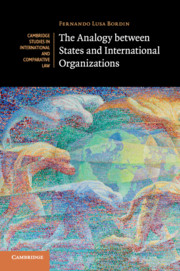Book contents
- The Analogy between States and International Organizations
- Cambridge Studies in International and Comparative Law: 138
- The Analogy between States and International Organizations
- Copyright page
- Dedication
- Contents
- Foreword
- Acknowledgements
- Table of Cases
- Select Table of Key Documents
- List of Abbreviations
- Introduction
- Part I The Case for an Analogy
- 1 Analogy in International Legal Reasoning
- 2 The Foundations of the Analogy between States and International Organizations
- Part II Objections to the Analogy
- Part III Limits of the Analogy
- Conclusion
- Bibliography
- Index
- Cambridge Studies in International and Comparative Law
1 - Analogy in International Legal Reasoning
from Part I - The Case for an Analogy
Published online by Cambridge University Press: 09 November 2018
- The Analogy between States and International Organizations
- Cambridge Studies in International and Comparative Law: 138
- The Analogy between States and International Organizations
- Copyright page
- Dedication
- Contents
- Foreword
- Acknowledgements
- Table of Cases
- Select Table of Key Documents
- List of Abbreviations
- Introduction
- Part I The Case for an Analogy
- 1 Analogy in International Legal Reasoning
- 2 The Foundations of the Analogy between States and International Organizations
- Part II Objections to the Analogy
- Part III Limits of the Analogy
- Conclusion
- Bibliography
- Index
- Cambridge Studies in International and Comparative Law
Summary
- Type
- Chapter
- Information
- Publisher: Cambridge University PressPrint publication year: 2018

